Leong Hou U
Connectivity-Guided Sparsification of 2-FWL GNNs: Preserving Full Expressivity with Improved Efficiency
Nov 16, 2025



Abstract:Higher-order Graph Neural Networks (HOGNNs) based on the 2-FWL test achieve superior expressivity by modeling 2- and 3-node interactions, but at $\mathcal{O}(n^3)$ computational cost. However, this computational burden is typically mitigated by existing efficiency methods at the cost of reduced expressivity. We propose \textbf{Co-Sparsify}, a connectivity-aware sparsification framework that eliminates \emph{provably redundant} computations while preserving full 2-FWL expressive power. Our key insight is that 3-node interactions are expressively necessary only within \emph{biconnected components} -- maximal subgraphs where every pair of nodes lies on a cycle. Outside these components, structural relationships can be fully captured via 2-node message passing or global readout, rendering higher-order modeling unnecessary. Co-Sparsify restricts 2-node message passing to connected components and 3-node interactions to biconnected ones, removing computation without approximation or sampling. We prove that Co-Sparsified GNNs are as expressive as the 2-FWL test. Empirically, on PPGN, Co-Sparsify matches or exceeds accuracy on synthetic substructure counting tasks and achieves state-of-the-art performance on real-world benchmarks (ZINC, QM9). This study demonstrates that high expressivity and scalability are not mutually exclusive: principled, topology-guided sparsification enables powerful, efficient GNNs with theoretical guarantees.
Hierarchical Frequency-Decomposition Graph Neural Networks for Road Network Representation Learning
Nov 16, 2025Abstract:Road networks are critical infrastructures underpinning intelligent transportation systems and their related applications. Effective representation learning of road networks remains challenging due to the complex interplay between spatial structures and frequency characteristics in traffic patterns. Existing graph neural networks for modeling road networks predominantly fall into two paradigms: spatial-based methods that capture local topology but tend to over-smooth representations, and spectral-based methods that analyze global frequency components but often overlook localized variations. This spatial-spectral misalignment limits their modeling capacity for road networks exhibiting both coarse global trends and fine-grained local fluctuations. To bridge this gap, we propose HiFiNet, a novel hierarchical frequency-decomposition graph neural network that unifies spatial and spectral modeling. HiFiNet constructs a multi-level hierarchy of virtual nodes to enable localized frequency analysis, and employs a decomposition-updating-reconstruction framework with a topology-aware graph transformer to separately model and fuse low- and high-frequency signals. Theoretically justified and empirically validated on multiple real-world datasets across four downstream tasks, HiFiNet demonstrates superior performance and generalization ability in capturing effective road network representations.
Moon: A Modality Conversion-based Efficient Multivariate Time Series Anomaly Detection
Oct 02, 2025Abstract:Multivariate time series (MTS) anomaly detection identifies abnormal patterns where each timestamp contains multiple variables. Existing MTS anomaly detection methods fall into three categories: reconstruction-based, prediction-based, and classifier-based methods. However, these methods face two key challenges: (1) Unsupervised learning methods, such as reconstruction-based and prediction-based methods, rely on error thresholds, which can lead to inaccuracies; (2) Semi-supervised methods mainly model normal data and often underuse anomaly labels, limiting detection of subtle anomalies;(3) Supervised learning methods, such as classifier-based approaches, often fail to capture local relationships, incur high computational costs, and are constrained by the scarcity of labeled data. To address these limitations, we propose Moon, a supervised modality conversion-based multivariate time series anomaly detection framework. Moon enhances the efficiency and accuracy of anomaly detection while providing detailed anomaly analysis reports. First, Moon introduces a novel multivariate Markov Transition Field (MV-MTF) technique to convert numeric time series data into image representations, capturing relationships across variables and timestamps. Since numeric data retains unique patterns that cannot be fully captured by image conversion alone, Moon employs a Multimodal-CNN to integrate numeric and image data through a feature fusion model with parameter sharing, enhancing training efficiency. Finally, a SHAP-based anomaly explainer identifies key variables contributing to anomalies, improving interpretability. Extensive experiments on six real-world MTS datasets demonstrate that Moon outperforms six state-of-the-art methods by up to 93% in efficiency, 4% in accuracy and, 10.8% in interpretation performance.
Underwater Image Quality Assessment: A Perceptual Framework Guided by Physical Imaging
Dec 20, 2024Abstract:In this paper, we propose a physically imaging-guided framework for underwater image quality assessment (UIQA), called PIGUIQA. First, we formulate UIQA as a comprehensive problem that considers the combined effects of direct transmission attenuation and backwards scattering on image perception. On this basis, we incorporate advanced physics-based underwater imaging estimation into our method and define distortion metrics that measure the impact of direct transmission attenuation and backwards scattering on image quality. Second, acknowledging the significant content differences across various regions of an image and the varying perceptual sensitivity to distortions in these regions, we design a local perceptual module on the basis of the neighborhood attention mechanism. This module effectively captures subtle features in images, thereby enhancing the adaptive perception of distortions on the basis of local information. Finally, by employing a global perceptual module to further integrate the original image content with underwater image distortion information, the proposed model can accurately predict the image quality score. Comprehensive experiments demonstrate that PIGUIQA achieves state-of-the-art performance in underwater image quality prediction and exhibits strong generalizability. The code for PIGUIQA is available on https://anonymous.4open.science/r/PIGUIQA-A465/
Tokenphormer: Structure-aware Multi-token Graph Transformer for Node Classification
Dec 19, 2024Abstract:Graph Neural Networks (GNNs) are widely used in graph data mining tasks. Traditional GNNs follow a message passing scheme that can effectively utilize local and structural information. However, the phenomena of over-smoothing and over-squashing limit the receptive field in message passing processes. Graph Transformers were introduced to address these issues, achieving a global receptive field but suffering from the noise of irrelevant nodes and loss of structural information. Therefore, drawing inspiration from fine-grained token-based representation learning in Natural Language Processing (NLP), we propose the Structure-aware Multi-token Graph Transformer (Tokenphormer), which generates multiple tokens to effectively capture local and structural information and explore global information at different levels of granularity. Specifically, we first introduce the walk-token generated by mixed walks consisting of four walk types to explore the graph and capture structure and contextual information flexibly. To ensure local and global information coverage, we also introduce the SGPM-token (obtained through the Self-supervised Graph Pre-train Model, SGPM) and the hop-token, extending the length and density limit of the walk-token, respectively. Finally, these expressive tokens are fed into the Transformer model to learn node representations collaboratively. Experimental results demonstrate that the capability of the proposed Tokenphormer can achieve state-of-the-art performance on node classification tasks.
VecCity: A Taxonomy-guided Library for Map Entity Representation Learning
Oct 31, 2024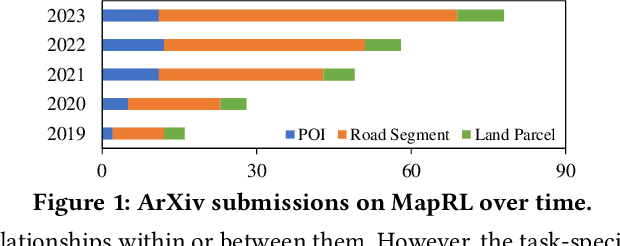
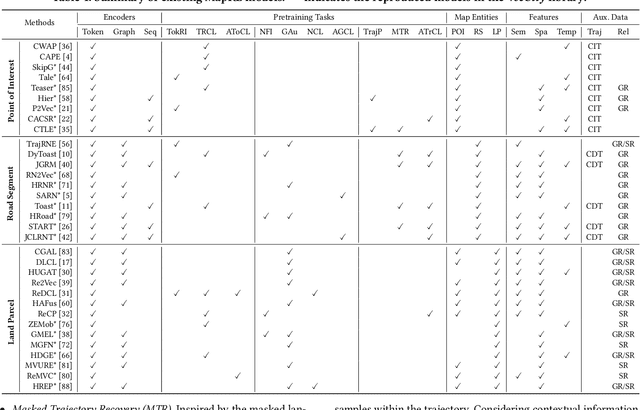
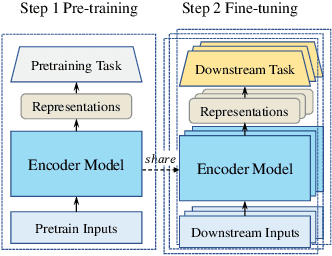
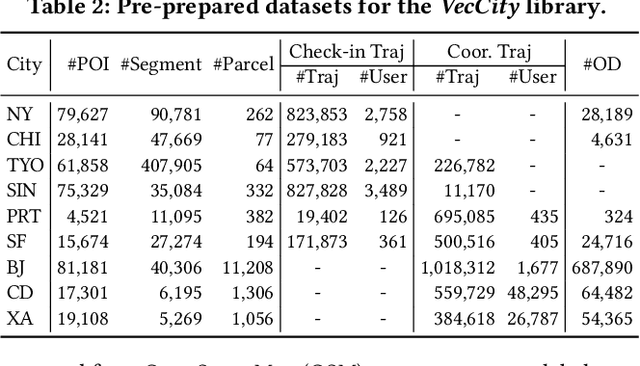
Abstract:Electronic maps consist of diverse entities, such as points of interest (POIs), road networks, and land parcels, playing a vital role in applications like ITS and LBS. Map entity representation learning (MapRL) generates versatile and reusable data representations, providing essential tools for efficiently managing and utilizing map entity data. Despite the progress in MapRL, two key challenges constrain further development. First, existing research is fragmented, with models classified by the type of map entity, limiting the reusability of techniques across different tasks. Second, the lack of unified benchmarks makes systematic evaluation and comparison of models difficult. To address these challenges, we propose a novel taxonomy for MapRL that organizes models based on functional module-such as encoders, pre-training tasks, and downstream tasks-rather than by entity type. Building on this taxonomy, we present a taxonomy-driven library, VecCity, which offers easy-to-use interfaces for encoding, pre-training, fine-tuning, and evaluation. The library integrates datasets from nine cities and reproduces 21 mainstream MapRL models, establishing the first standardized benchmarks for the field. VecCity also allows users to modify and extend models through modular components, facilitating seamless experimentation. Our comprehensive experiments cover multiple types of map entities and evaluate 21 VecCity pre-built models across various downstream tasks. Experimental results demonstrate the effectiveness of VecCity in streamlining model development and provide insights into the impact of various components on performance. By promoting modular design and reusability, VecCity offers a unified framework to advance research and innovation in MapRL. The code is available at https://github.com/Bigscity-VecCity/VecCity.
Efficient Diversity-based Experience Replay for Deep Reinforcement Learning
Oct 27, 2024



Abstract:Deep Reinforcement Learning (DRL) has achieved remarkable success in solving complex decision-making problems by combining the representation capabilities of deep learning with the decision-making power of reinforcement learning. However, learning in sparse reward environments remains challenging due to insufficient feedback to guide the optimization of agents, especially in real-life environments with high-dimensional states. To tackle this issue, experience replay is commonly introduced to enhance learning efficiency through past experiences. Nonetheless, current methods of experience replay, whether based on uniform or prioritized sampling, frequently struggle with suboptimal learning efficiency and insufficient utilization of samples. This paper proposes a novel approach, diversity-based experience replay (DBER), which leverages the deterministic point process to prioritize diverse samples in state realizations. We conducted extensive experiments on Robotic Manipulation tasks in MuJoCo, Atari games, and realistic in-door environments in Habitat. The results show that our method not only significantly improves learning efficiency but also demonstrates superior performance in sparse reward environments with high-dimensional states, providing a simple yet effective solution for this field.
Large Language Model Enhanced Knowledge Representation Learning: A Survey
Jul 01, 2024



Abstract:The integration of Large Language Models (LLMs) with Knowledge Representation Learning (KRL) signifies a pivotal advancement in the field of artificial intelligence, enhancing the ability to capture and utilize complex knowledge structures. This synergy leverages the advanced linguistic and contextual understanding capabilities of LLMs to improve the accuracy, adaptability, and efficacy of KRL, thereby expanding its applications and potential. Despite the increasing volume of research focused on embedding LLMs within the domain of knowledge representation, a thorough review that examines the fundamental components and processes of these enhanced models is conspicuously absent. Our survey addresses this by categorizing these models based on three distinct Transformer architectures, and by analyzing experimental data from various KRL downstream tasks to evaluate the strengths and weaknesses of each approach. Finally, we identify and explore potential future research directions in this emerging yet underexplored domain, proposing pathways for continued progress.
A General Early-Stopping Module for Crowdsourced Ranking
Nov 04, 2019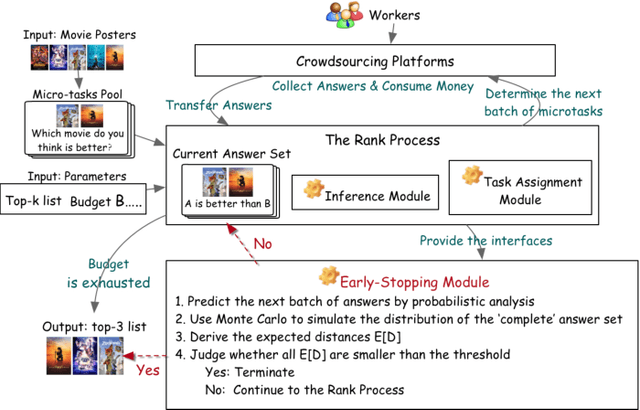


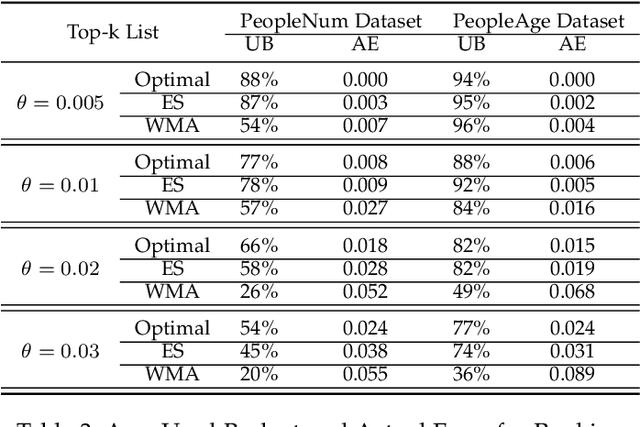
Abstract:Crowdsourcing can be used to determine a total order for an object set (e.g., the top-10 NBA players) based on crowd opinions. This ranking problem is often decomposed into a set of microtasks (e.g., pairwise comparisons). These microtasks are passed to a large number of workers and their answers are aggregated to infer the ranking. The number of microtasks depends on the budget allocated for the problem. Intuitively, the higher the number of microtask answers, the more accurate the ranking becomes. However, it is often hard to decide the budget required for an accurate ranking. We study how a ranking process can be terminated early, and yet achieve a high-quality ranking and great savings in the budget. We use statistical tools to estimate the quality of the ranking result at any stage of the crowdsourcing process and terminate the process as soon as the desired quality is achieved. Our proposed early-stopping module can be seamlessly integrated with most existing inference algorithms and task assignment methods. We conduct extensive experiments and show that our early-stopping module is better than other existing general stopping criteria. We also implement a prototype system to demonstrate the usability and effectiveness of our approach in practice.
 Add to Chrome
Add to Chrome Add to Firefox
Add to Firefox Add to Edge
Add to Edge